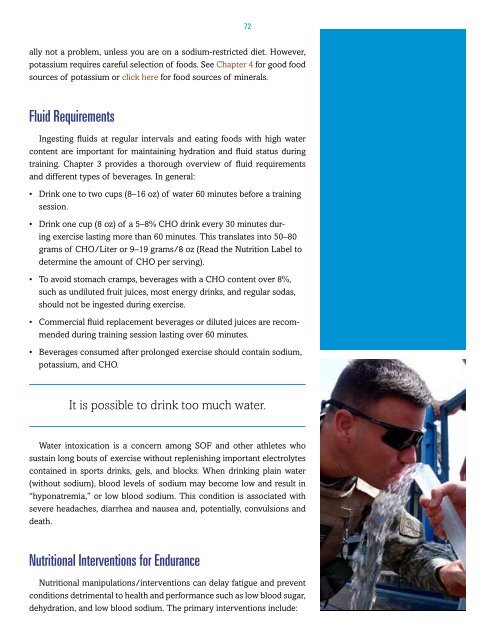special-operations-nutrition-guide
special-operations-nutrition-guide
special-operations-nutrition-guide
You also want an ePaper? Increase the reach of your titles
YUMPU automatically turns print PDFs into web optimized ePapers that Google loves.
72<br />
ally not a problem, unless you are on a sodium-restricted diet. However,<br />
potassium requires careful selection of foods. See Chapter 4 for good food<br />
sources of potassium or click here for food sources of minerals.<br />
Fluid Requirements<br />
Ingesting fluids at regular intervals and eating foods with high water<br />
content are important for maintaining hydration and fluid status during<br />
training. Chapter 3 provides a thorough overview of fluid requirements<br />
and different types of beverages. In general:<br />
• Drink one to two cups (8–16 oz) of water 60 minutes before a training<br />
session.<br />
• Drink one cup (8 oz) of a 5–8% CHO drink every 30 minutes during<br />
exercise lasting more than 60 minutes. This translates into 50–80<br />
grams of CHO/Liter or 9–19 grams/8 oz (Read the Nutrition Label to<br />
determine the amount of CHO per serving).<br />
• To avoid stomach cramps, beverages with a CHO content over 8%,<br />
such as undiluted fruit juices, most energy drinks, and regular sodas,<br />
should not be ingested during exercise.<br />
• Commercial fluid replacement beverages or diluted juices are recommended<br />
during training session lasting over 60 minutes.<br />
• Beverages consumed after prolonged exercise should contain sodium,<br />
potassium, and CHO.<br />
It is possible to drink too much water.<br />
Water intoxication is a concern among SOF and other athletes who<br />
sustain long bouts of exercise without replenishing important electrolytes<br />
contained in sports drinks, gels, and blocks. When drinking plain water<br />
(without sodium), blood levels of sodium may become low and result in<br />
“hyponatremia,” or low blood sodium. This condition is associated with<br />
severe headaches, diarrhea and nausea and, potentially, convulsions and<br />
death.<br />
Nutritional Interventions for Endurance<br />
Nutritional manipulations/interventions can delay fatigue and prevent<br />
conditions detrimental to health and performance such as low blood sugar,<br />
dehydration, and low blood sodium. The primary interventions include:


